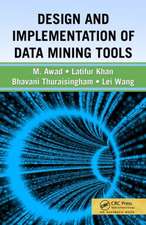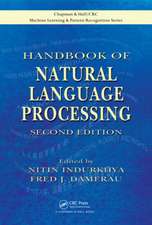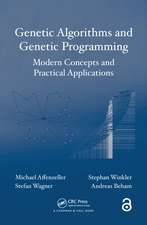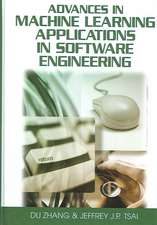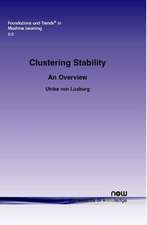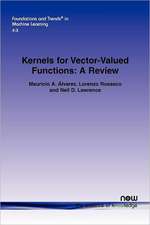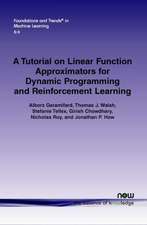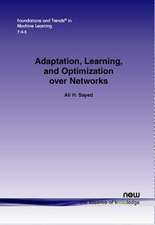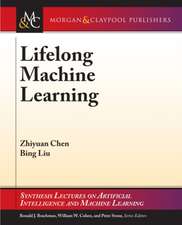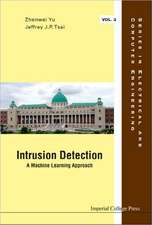Deep Reinforcement Learning: Fundamentals, Research and Applications
Editat de Hao Dong, Zihan Ding, Shanghang Zhangen Limba Engleză Hardback – 30 iun 2020
The book is intended for computer science students, both undergraduate and postgraduate, who would like to learn DRL from scratch, practice its implementation, and explore the research topics. It also appeals to engineers and practitioners who do not have strong machine learning background, but want to quickly understand how DRL works and use the techniques in their applications.
| Toate formatele și edițiile | Preț | Express |
|---|---|---|
| Paperback (1) | 1023.38 lei 38-44 zile | |
| Springer Nature Singapore – 30 iun 2021 | 1023.38 lei 38-44 zile | |
| Hardback (1) | 1022.20 lei 38-44 zile | |
| Springer Nature Singapore – 30 iun 2020 | 1022.20 lei 38-44 zile |
Preț: 1022.20 lei
Preț vechi: 1277.75 lei
-20% Nou
Puncte Express: 1533
Preț estimativ în valută:
195.59€ • 204.77$ • 161.84£
195.59€ • 204.77$ • 161.84£
Carte tipărită la comandă
Livrare economică 01-07 aprilie
Preluare comenzi: 021 569.72.76
Specificații
ISBN-13: 9789811540943
ISBN-10: 9811540942
Pagini: 514
Ilustrații: XXVII, 514 p. 489 illus., 208 illus. in color.
Dimensiuni: 155 x 235 mm
Greutate: 0.91 kg
Ediția:1st ed. 2020
Editura: Springer Nature Singapore
Colecția Springer
Locul publicării:Singapore, Singapore
ISBN-10: 9811540942
Pagini: 514
Ilustrații: XXVII, 514 p. 489 illus., 208 illus. in color.
Dimensiuni: 155 x 235 mm
Greutate: 0.91 kg
Ediția:1st ed. 2020
Editura: Springer Nature Singapore
Colecția Springer
Locul publicării:Singapore, Singapore
Cuprins
Preface.- Contributors.- Acknowledgements.- Mathematical Notation.- Acronyms.- Introduction.- Part 1: Foundamentals.- Chapter 1: Introduction to Deep Learning.- Chapter 2: Introduction to Reinforcement Learning.- Chapter 3: Taxonomy of Reinforcement Learning Algorithms.- Chapter 4: Deep Q-Networks.- Chapter 5: Policy Gradient.- Chapter 6: Combine Deep Q-Networks with Actor-Critic.- Part II: Research.- Chapter 7: Challenges of Reinforcement Learning.- Chapter 8: Imitation Learning.- Chapter 9: Integrating Learning and Planning.- Chapter 10: Hierarchical Reinforcement Learning.- Chapter 11: Multi-Agent Reinforcement Learning.- Chapter 12: Parallel Computing.- Part III: Applications.- Chapter 13: Learning to Run.- Chapter 14: Robust Image Enhancement.- Chapter 15: AlphaZero.- Chapter 16: Robot Learning in Simulation.- Chapter 17: Arena Platform for Multi-Agent Reinforcement Learning.- Chapter 18: Tricks of Implementation.- Part IV: Summary.- Chapter 19: Algorithm Table.- Chapter 20: Algorithm Cheatsheet.
Notă biografică
Dr. Hao Dong is currently an Assistant Professor at Peking University. He received his Ph.D. in Computing from Imperial College London in 2019, supervised by Prof. Yike Guo. Hao’s research chiefly involves Deep Learning and Computer Vision, with the goal of reducing the amount of data required for learning intelligent systems. He is passionate about popularizing artificial intelligence technologies and established TensorLayer, a deep learning and reinforcement learning library for scientists and engineers, which won the Best Open Source Software Award at ACM Multimedia 2017.
Zihan Ding received his M.Sc. degree in Machine Learning with distinction from the Department of Computing, Imperial College London, supervised by Dr. Edward Johns. He holds double Bachelor degrees from the University of Science and Technology of China: in Photoelectric Information Science and Engineering (Physics) and in Computer Science and Technology. His research interests includedeep reinforcement learning, robotics, computer vision, quantum computation and machine learning. He has published papers in ICRA, AAAI, NIPS, IJCAI, and Physical Review. He also contributed to the open-source projects TensorLayer RLzoo, TensorLet and Arena.
Dr. Shanghang Zhang is a postdoctoral research fellow in the Berkeley AI Research (BAIR) Lab, the Department of Electrical Engineering and Computer Sciences, UC Berkeley, USA. She received her Ph.D. from Carnegie Mellon University in 2018. Her research interests cover deep learning, computer vision, and reinforcement learning, as reflected in her numerous publications in top-tier journals and conference proceedings, including NeurIPS, CVPR, ICCV, and AAAI. Her research mainly focuses on machine learning with limited training data, including low-shot learning, domain adaptation, and meta-learning, which enables the learning system to automatically adapt to real-world variations and new environments. She was one of the “2018 Rising Stars in EECS” (a highly selective program launched at MIT in 2012, which has since been hosted at UC Berkeley, Carnegie Mellon, and Stanford annually). She has also been selected for the Adobe Academic Collaboration Fund, Qualcomm Innovation Fellowship (QInF) Finalist Award, and Chiang Chen Overseas Graduate Fellowship.
Textul de pe ultima copertă
Deep reinforcement learning (DRL) is the combination of reinforcement learning (RL) and deep learning. It has been able to solve a wide range of complex decision-making tasks that were previously out of reach for a machine, and famously contributed to the success of AlphaGo. Furthermore, it opens up numerous new applications in domains such as healthcare, robotics, smart grids and finance.
Divided into three main parts, this book provides a comprehensive and self-contained introduction to DRL. The first part introduces the foundations of deep learning, reinforcement learning (RL) and widely used deep RL methods and discusses their implementation. The second part covers selected DRL research topics, which are useful for those wanting to specialize in DRL research. To help readers gain a deep understanding of DRL and quickly apply the techniques in practice, the third part presents mass applications, such as the intelligent transportation system and learning to run, with detailed explanations.
The book is intended for computer science students, both undergraduate and postgraduate, who would like to learn DRL from scratch, practice its implementation, and explore the research topics. It also appeals to engineers and practitioners who do not have strong machine learning background, but want to quickly understand how DRL works and use the techniques in their applications.
Divided into three main parts, this book provides a comprehensive and self-contained introduction to DRL. The first part introduces the foundations of deep learning, reinforcement learning (RL) and widely used deep RL methods and discusses their implementation. The second part covers selected DRL research topics, which are useful for those wanting to specialize in DRL research. To help readers gain a deep understanding of DRL and quickly apply the techniques in practice, the third part presents mass applications, such as the intelligent transportation system and learning to run, with detailed explanations.
The book is intended for computer science students, both undergraduate and postgraduate, who would like to learn DRL from scratch, practice its implementation, and explore the research topics. It also appeals to engineers and practitioners who do not have strong machine learning background, but want to quickly understand how DRL works and use the techniques in their applications.
Caracteristici
Offers a comprehensive and self-contained introduction to deep reinforcement learning Covers deep reinforcement learning from scratch to advanced research topics Provides rich example codes (free access through Github) to help readers to practice and implement the methods easily







